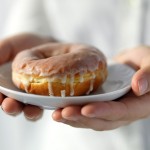A few days ago I re-read Taubes's July 2002 article in The New York Times and the November 2002 "Nutrition Action Health Letter" article from CSPI that looked at his claims that refined carbohydrates are the problem and contradicted many of them. I have 40+ years of personal experience of reading articles critically. I fully understand that all one sees in print may not tell the entire story or may be slanted toward a particular view of the truth.
But I was still surprised to see a Wall Street Journal article ("Personal Journal, Wednesday July 7, 2011 pp. D1-2) titled "Sweet Revenge, Chefs Pour on the Sugar."
The story of high-fructose corn syrup dates back to the aftermath of WWII. Two major war-time industries needed to continue employing large numbers of workers, especially with all the GIs returning. So toxic chemicals became pesticides and gunpowder morphed into fertilizer. Corn was felt to be the most efficient crop in converting sunlight to food energy, so it became the most favored crop. Soon there was the question of new uses for all that corn.
High-fructose corn syrup (HFCS) was first introduced by Richard O. Marshall and Earl R. Kooi in 1957. The industrial production process was developed by Dr. Y. Takasaki in Japan from 1965 to 1970 and Takasaki is known to many as the creator of HFCS. HFCS was rapidly introduced to many processed foods and soft drinks in the U.S. from about 1975 to 1985.
High-fructose corn syrup is produced by milling corn to produce corn starch, then processing that starch to yield corn syrup, which is almost entirely glucose, and then adding enzymes that change some of the glucose into fructose.
The problem of course, is the rapid absorption of both HFCS and table sugar leading to a surge of insulin levels, resultant lowering of elevated blood sugar levels and, perhaps to hunger and subsequent over-eating. Taubes may have that part correct.
Now however, many high-level chefs are turning away from HFCS and substituting sugar. That's also been true for food-producing companies; you can now purchase Wheat Thins or Pepsi sweetened with sugar instead of HFCS.
But my copy of Harvard's School of Public Health "Nutrition Source Update," led me to their new Healthy Eating Pyramid (link below) which puts sugary drinks and sweets at the small end with a comment to use them sparingly.
http://www.hsph.harvard.edu/nutritionsource/what-should-you-eat/pyramid/index.html
The chef's in the "Sweet Revenge" article have it wrong; they think HFCS is worse for you than sugar (many scientists think both have negative effects on health) and are surprised to find it in so many commercial foods, e.g., oyster crackers.
The American Medical Association and the American Dietetic Association both urge all of us to restrict our intake of all caloric sweeteners. The research director of the University of Cincinnati's Diabetes and Obesity Center says HFCS and table sugar are biochemically identical.
So I believe it's time to cut down on HFCS, table sugar, honey, brown sugar, golden syrup (made from cane sugar) and even agave nectar.
Your dentist will be happy and in the long run I think you'll have better overall health.



